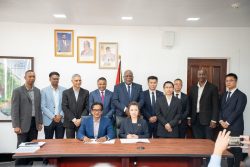Not unsurprisingly, the Minister of Parliamen-tary Affairs and Governance, Gail Teixeira has mounted a defence of her government’s record against corruption in light of this year’s Trans-parency International (TI) report which again puts the country in an unflattering light.
While conceding that she was not arguing that corruption was not a problem, the minister’s main contention was that “non-empirical, non-scientific data cannot be the standard by which such a serious issue is measured by Transparency International or any other organization”.
It is an argument that is often made but detracts very little from the standing that TI has developed over the years of its work and the credible sources of information that it has relied on.
So, where is the empirical and scientific data to prove or disprove the state of corruption in Guyana to come from? The Minister provided no answer but she is well aware that there is no generator anywhere of such empiricism and certainly not from a government in power. Which is why over time – given the inherent difficulty in securing witnesses, evidence and convictions – organisations like TI have relied on the perceptions of a range of international bodies that have a very good feel for what happens in countries based on their own assessments and the experience of their staff.
Let’s cast aside TI for the moment and consider the situation on the ground – something far more tangible than perception. It is the case that over the last few months the government itself has brought hundreds of charges including money laundering against the now dismissed Assistant Commissioner of Police Calvin Brutus who had been on a pathway to the position of Deputy Commissioner of the Police Force.
What triggered the charges in the fifth year of the Ali presidency is unclear when one considers that Mr Brutus had been seen as one of the most senior figures in the force. It has also been argued that what he has been accused of could hardly have pertained only to him given the structure of the force. While others have faced related charges, questions remain about the insidiousness of the problem in the police force. It is left to be seen whether convictions will be secured and whether the gift giving at his sumptuous wedding by a barrage of notables will lead anywhere.
Routinely policemen and women have appeared before the court after caught redhanded with theft, drug trafficking and other crimes. Bribery by traffic cops remains a blatant and expansive problem which recently saw warnings that they should all be equipped with cameras as a deterrent.
Just recently, following a series of questions from businessman Terrence Campbell about a property in New York, the Chief Executive Officer of the Central Housing and Planning Authority, Mr Sherwyn Greaves suddenly resigned his position without providing any answers. Think of it, the man who has been the chief operating officer of the government’s programme of house lot distribution and assignment of commercial lands to businessmen for more than four years has resigned just like that after legitimate questions were asked about an expensive property in New York.
While 95% of the housing programme could possibly be run perfectly legitimately and transparently, it’s the other five per cent that can ratchet up the corruption barometer as that is where the mega deals and kickbacks might come into play. No evidence has been presented against Mr Greaves but the government has not behaved like the one Ms Teixeira has assiduously tried to paint a picture of. No investigation of Mr Greaves is to be mounted at all. One would have thought that in a transparent government, the Minister of Housing would have immediately sought answers from Mr Greaves and presented them to the public and if warranted, the launching of an investigation. The Minister of Housing has been silent on the matter and so too has been President Ali whose image of taking these matters on frontally was burnished by his famous 5.30 am meeting. The failure to investigate the allegation against Mr Greaves is exactly what will lead to untoward perceptions of corruption in Guyana. The silence of the government did not mean that the major anti crime units could not have taken an interest in Mr Greaves’ matter but some type of paralysis appears to have taken hold.
In June last year, the US Treasury Department sanctioned businessmen Nazar Mohamed and his son Azruddin Mohamed and Permanent Secretary in the Ministry of Labour Mae Thomas Toussaint for alleged corruption. All three have denied any wrongdoing.
The government had had warning signs. Ms Toussaint Jr Thomas was in transit to China on April 8 2023 when she was subjected to what is called a secondary inspection by US Customs and Border Protection at Miami Airport. They seized her cell phone, and questioned her for an unknown period of time. It subsequently became public knowledge that her visa had been revoked on April 10.
After this incident she was simply shifted as Permanent Secretary in the Ministry of Home Affairs to the Ministry of Labour. She also featured prominently at the last year’s congress of the ruling People’s Progressive Party. Her sanctioning by the US pertains to her tenure at the Ministry of Home Affairs.
According to the Department of the Treasury’s Office of Foreign Assets Control (OFAC) Azruddin Mohamed and Mohamed’s Enterprise evaded Guy-ana’s tax on gold exports and defrauded the Guya-nese government of tax revenues by under declaring their gold exports to Guyanese authorities. Between 2019 and 2023, Mohamed’s Enterprise allegedly omitted more than 10 thousand kilograms of gold from import and export declarations and avoided paying more than US$50 million in duty taxes to the Government of Guyana.
It further alleged that Mohamed’s Enterprise had bribed customs officials to falsify import and export documents, as well as to facilitate illicit gold shipments. “Mohamed’s Enterprise had paid bribes to Guyanese government officials to ensure the undisrupted flow of inbound and outbound personnel that move currency and other items on behalf of Azruddin and Mohamed’s Enterprise”, OFAC added.
If only a percentage of this claim is correct, it would signify corruption of a grand scale cutting across any number of regulatory agencies from the Gold Board, the GGMC, the GRA and the ports to law enforcement and raise questions about the anti-money laundering infrastructure. Aside from an approach by the government to the US Department of Justice for information there has not been a single local investigation of this matter by any of the numerous agencies that should have taken an interest in it. That is certainly not a perception of good governance but one that harks strongly in the direction of turning a blind eye to corruption. Furthermore, the most senior public servant in two big ministries – and with overt ties to the ruling party – was simply moved aside.
Stopping here would be enough to expose the serious corruption problems afflicting the state and the absence of resolution but there is also the case of the blatant award of contracts to the unqualified which must be a tangible expression of corruption and not a perception. What makes it even more galling is the absolute refusal of Ms Teixeira’s government to do anything about it.
The case of the award of a pump station contract to Mikhail Rodrigues of Tepui Inc is the most notorious of the examples. What it alarmingly exemplifies is the ability to corrupt the tender board process to award contracts to the hopelessly unqualified but politically favoured. Again, 95% of the contracts awarded might be perfectly in order. It is the remainder that could contain the major corruption lash. In underlining the steps taken by the government, Ms Teixeira pointed to the publishing of the minutes and awards of tenders on the website of the National Procurement and Tender Administration Board. That counts for very little if the process prior to publication can be manipulated to make awards like that of the pump station to Tepui Inc.
Under the sub heading of ‘Five Years of Progress’, Ms Teixeira lists all of the measures taken by her government to strengthen the fight against corruption. She said that this included re-establishing and strengthening critical oversight bodies. While some of these have indeed been reactivated – and sometimes only after prodding by the media as was the case with the Local Government Commission – they are in the main staffed by persons who are close to the government and ruling party, raising questions about their independence of action. Several of them have been found wanting in addressing matters that fall within their purview.
Many of the actions mentioned by Ms Teixeira represent perfunctory bureaucratic acts with negligible connection to the actual fight against corruption. Interestingly, the minister did not mention the moribund Office of the Commissioner of Information. Neither could she mention the very potent weapon against corruption – whistle blowing. During its four and a half years in office, the government has signally failed to activate whistle-blowing legislation as it clearly fears what it may be confronted with. If it was serious about combating corruption head-on this legislation would have been fully enforced and available to those with important information.
While one can argue endlessly about TI’s index and what it means, it is clear that a serious corruption problem exists here and the government has shown little will to address it.









